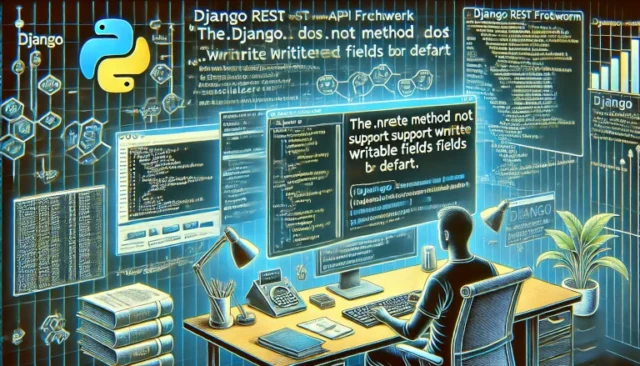Developers working with Django REST Framework (DRF) often encounter the error: “The .create() method does not support writable nested fields by default.” This issue typically arises when trying to create or update related objects through a serializer. Since Django does not automatically handle nested data serialization and deserialization, developers need to manually override the create() and update() methods to process nested fields properly. This guide will explain why this error occurs, how to fix it, and the best practices for handling nested fields in Django REST Framework.
Understanding the Error: Why Does .create() Not Support Writable Nested Fields?
🔹 Django REST Framework serializers convert complex data types like Django model instances into Python native data types and vice versa.
🔹 When using nested serializers, Django requires explicit handling of how related objects should be created or updated.
🔹 By default, DRF does not support creating nested objects because it expects primary keys for relationships instead of raw nested data.
🔹 If the create() method encounters nested data without specific instructions, it raises the error: “The .create() method does not support writable nested fields by default.”
Understanding this behavior is crucial when dealing with ForeignKey and ManyToMany relationships in Django models.
How to Fix the Error in Django REST Framework?
Consider the following models.py file with a Parent-Child relationship where a Book has multiple Chapters:
from django.db import models
class Book(models.Model):
title = models.CharField(max_length=255)
author = models.CharField(max_length=255)
class Chapter(models.Model):
book = models.ForeignKey(Book, related_name='chapters', on_delete=models.CASCADE)
title = models.CharField(max_length=255)
content = models.TextField()
In the corresponding serializers.py, using a nested serializer without overriding create() will trigger the error:
from rest_framework import serializers
from .models import Book, Chapter
class ChapterSerializer(serializers.ModelSerializer):
class Meta:
model = Chapter
fields = '__all__'
class BookSerializer(serializers.ModelSerializer):
chapters = ChapterSerializer(many=True)
class Meta:
model = Book
fields = '__all__'
When sending a POST request with nested data:
{
"title": "Django for Beginners",
"author": "John Doe",
"chapters": [
{"title": "Introduction", "content": "Welcome to Django!"},
{"title": "Models", "content": "Understanding Django Models."}
]
}
Django will raise the error “The .create() method does not support writable nested fields by default.” because the serializer is trying to create Chapter instances inside BookSerializer, which Django does not support automatically.
Implementing a Custom create() Method to Handle Nested Fields
To allow nested object creation, override the create() method in BookSerializer:
class BookSerializer(serializers.ModelSerializer):
chapters = ChapterSerializer(many=True)
class Meta:
model = Book
fields = '__all__'
def create(self, validated_data):
chapters_data = validated_data.pop('chapters')
book = Book.objects.create(**validated_data)
for chapter_data in chapters_data:
Chapter.objects.create(book=book, **chapter_data)
return book
Now, when a POST request is made with nested chapter data, Django will properly create both the Book and Chapter instances.
Handling Updates for Nested Fields Using the update() Method
To update nested fields, override the update() method in the BookSerializer:
class BookSerializer(serializers.ModelSerializer):
chapters = ChapterSerializer(many=True)
class Meta:
model = Book
fields = '__all__'
def update(self, instance, validated_data):
chapters_data = validated_data.pop('chapters')
instance.title = validated_data.get('title', instance.title)
instance.author = validated_data.get('author', instance.author)
instance.save()
instance.chapters.all().delete() # Remove old chapters
for chapter_data in chapters_data:
Chapter.objects.create(book=instance, **chapter_data)
return instance
This method ensures that when a PUT request is sent with updated nested data, the existing chapters are replaced with new ones.
Common Issues and Troubleshooting in Nested Serializers
1. ForeignKey Constraint Error When Creating Nested Objects
✔ Ensure that nested objects are created only after the parent object. The pop() method prevents premature object creation.
✔ Always include related_name in ForeignKey relationships to avoid reverse access conflicts.
2. Validation Errors When Updating Nested Objects
✔ If existing child objects should be updated rather than replaced, modify update() to check for existing objects before deleting.
for chapter_data in chapters_data:
chapter, created = Chapter.objects.update_or_create(
book=instance, title=chapter_data['title'], defaults=chapter_data
)
This method updates existing records instead of deleting and recreating them.
3. ManyToMany Relationships Not Saving Correctly
✔ If handling a ManyToManyField, use set() instead of create(), ensuring proper relation assignment:
instance.categories.set(categories_data)
Why Overriding create() is Essential for Nested Serialization?
🔹 DRF does not support nested object creation automatically, requiring explicit handling.
🔹 Manually overriding create() and update() ensures data consistency when working with ForeignKey relationships.
🔹 Prevents common integrity errors when dealing with nested JSON data structures.
🔹 Optimized for API performance, ensuring database queries are handled efficiently.
By implementing custom serialization logic, developers can efficiently manage nested relationships in Django REST Framework without errors.
The error “The .create() method does not support writable nested fields by default.” occurs because Django does not automatically handle nested object creation. By overriding the create() and update() methods, developers can properly process nested relationships, manage ForeignKey dependencies, and prevent database errors. Whether dealing with parent-child relationships or ManyToMany fields, implementing custom serialization logic ensures seamless data handling.
Start using customized serializers today and take full control over nested object creation in Django REST Framework!
